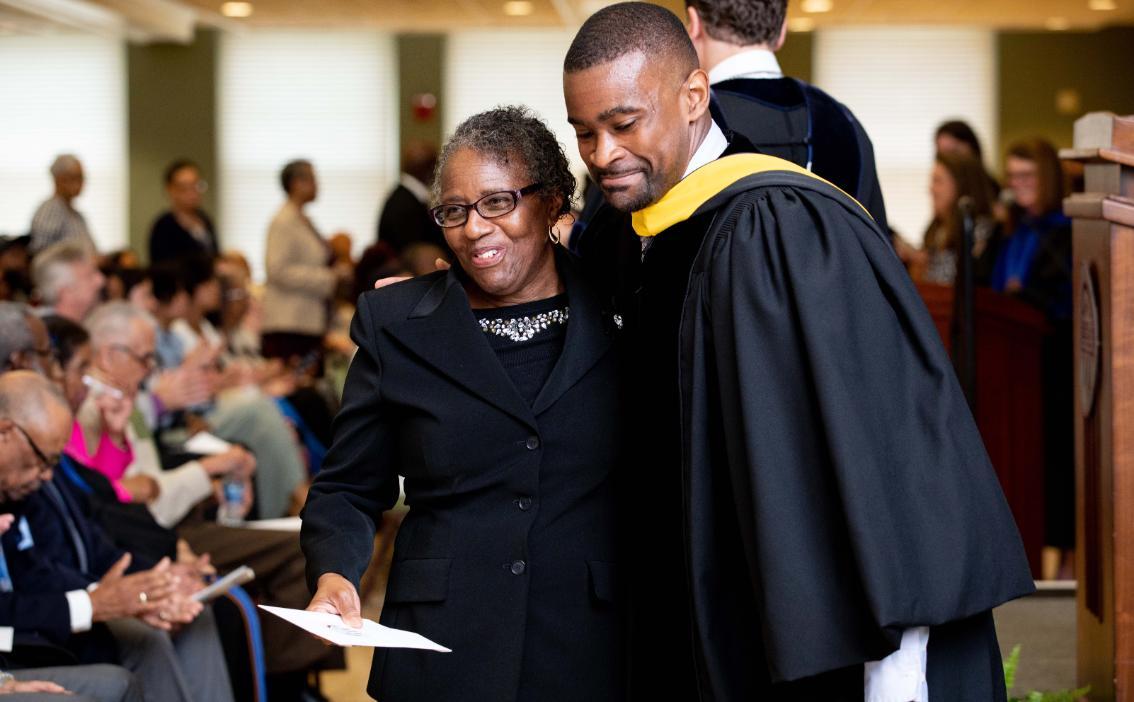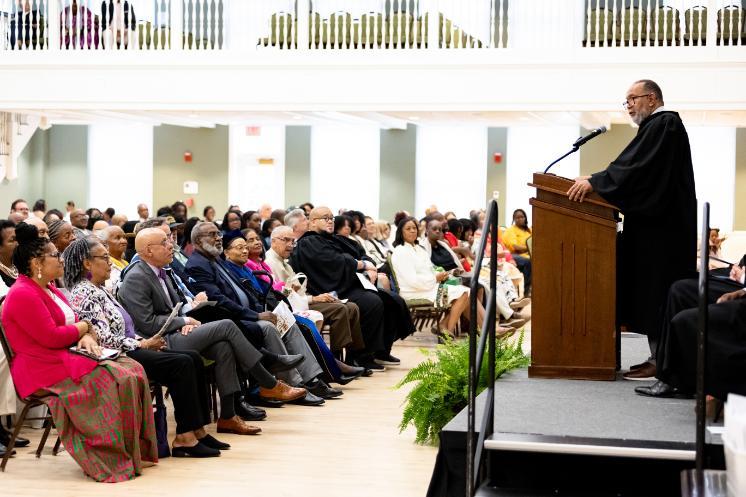

They came from near and far, across generations. Some were there to honor history they had lived themselves, others to honor friends and family who had helped pave the way, knocking down walls that blocked education.
It was the culmination of a weekend-long celebration in which Longwood honored the nation-shaping civil rights history of Prince Edward County, and the role that residents of our home community played.
On Friday, the 70th anniversary of the Brown v. Board of Education Supreme Court decision that included plaintiffs from Prince Edward, Gov. Glenn Youngkin visited the Moton Museum. At that afternoon’s graduate student commencement ceremony, the speaker was constitutional scholar A.E. Dick Howard, who as a young law clerk played an instrumental role in another landmark case -- Griffin v. Prince Edward – that was handed down 60 years ago this month which reopened public schools in Prince Edward County and also helped secure the right to equality of opportunity in education.

Your suffering and sacrifice have made the lives of many quite better. They have opportunities that our ancestors could not imagine.
L. Francis “Skip” Griffin Tweet This
On Saturday, the speaker at Longwood’s undergraduate Commencement was Joan Johns Cobbs, sister of Barbara Johns who as a 16-year-old led the 1951 walkout of students at Moton, including Joan, that helped set the Brown case in motion. Three-quarters of the plaintiffs in that case came from Prince Edward. On May 16, the day before the Brown decision’s anniversary, Cobbs joined John Stokes, one of the organizers of the walkout and a plaintiff in the Brown case, at the White House to meet with and be honored by President Biden.
At Saturday’s undergraduate Commencement, Cobbs told graduates they have the ability to make a meaningful difference in the world at any age, citing the fact that her sister was so young when she led fellow students in the strike.
“Barbara decided to do something about it,” Cobbs said. “Her actions have inspired others to call for change. But Barbara did more than call for change. She worked patiently with others taking steps to challenge in the courts the laws that she knew were wrong. These legal challenges changed the course of the nation.”
Finally, in a deeply moving ceremony on Sunday, Longwood honored with tributes and honorary degrees members of the generations who helped make that history, as well as those who were not able to attend Longwood before it was itself desegregated in the 1960s.
The feel of the event was part history lesson, part family reunion, part revival, and part academic ceremony.
“Because of what you did here, public education is still a reality in Virginia,” said keynote speaker L. Francis “Skip” Griffin, who was among those locked out of the public schools when they were closed from 1959-64, and is the son of Rev. Francis L. Griffin, H. ’19, who served as counselor to generations of Moton students. “Because of what you did here, Black children can go to Longwood and the University of Virginia and William and Mary and Hampden-Sydney. They can get B.A.s, they can get master’s degrees, they can get doctorates. Some of our own children, even though we were locked out or had to find other ways to go to school, some of our own children are now possessors of doctorate degrees and hold proud positions in universities and other organizations.”
“Your suffering and sacrifice have made the lives of many quite better,” he said. “They have opportunities that our ancestors could not imagine.”
Longwood University honors the heroes of the Civil Rights Movement
Longwood President W. Taylor Reveley IV told those in attendance, that “more than just these anniversaries, today we honor and celebrate you, the heroes of those causes, the actors in this history, who each in your own way took concrete steps–argued, persuaded, made use of the tools of democracy, to move our nation forward.”
Reveley acknowledged the history of those in the audience had intersected with Longwood’s history in challenging and sometimes painful ways. In 2014, Longwood’s Board of Visitors apologized for the university’s actions and inactions during the civil rights era, and launched a partnership “in perpetuity” with the Moton Museum to help advance understanding of Virginia’s civil rights history and expand opportunity in education.
“Our story together has seen disappointment, struggle and sorrow and setbacks,” Reveley said. “It has also seen progress, change, and, I hope today, pride and joy. Not all in equal measure, and not always in a straight line. As we gather today, we acknowledge and honor all of this.”
Provost and Vice President for Academic Affairs Dr. Larissa Smith, a civil rights historian and longtime liaison to the Moton Museum, read the names of honorees who received an honorary juris doctor diploma, beginning with those who could not make the ceremony, but many of whom were watching via livestream.
As Smith finished the names of those absent, honorees who were present lined up to have their names called and walk across in front of the stage to greet the president and be applauded by the assembled crowd. The line that stretched around the back of the room was generational – Moton strikers and lockout victims stood next to children, grandchildren, nieces and nephews, and godchildren of honorees, all there to honor their loved ones’ sacrifice and struggle.
-746x497.jpg)
It was a deeply emotional experience that highlights the interconnectedness of family, the importance of education, and the enduring impact of legacy.
LaTreasa Earley-Woodson Tweet This
“It was a powerful blend of pride, nostalgia, and sadness,” said LaTreasa Earley-Woodson, who watched her son Jayden walk across the stage on behalf of his grandfather and uncle, Vincent Lowell Earley and Lawrence Emerson Early. His grandmother, Shirley Nunnally Earley, who was among those locked out of the public schools and initially denied admission to Longwood, followed behind him on her own behalf. Shirley Earley later enrolled at Longwood, earning a bachelor of science in sociology in 1979 and a master’s degree in education guidance and counseling in 1991.
“I wanted Jayden to feel a connection to his grandfather and have a desire to live up to his standards and achievements,” said LaTreasa Earley-Woodson. “It was a deeply emotional experience that highlights the interconnectedness of family, the importance of education, and the enduring impact of legacy.”
Honorees and guests heard from three other speakers: Cornell Walker, president of the R.R. Moton/Prince Edward Alumni Association; A.D. “Chuckie” Reid, chair of the Moton Council and member of the Prince Edward NAACP and Vice-Mayor of Farmville; and Longwood associate professor emeritus Dr. Theresa Clark, M.S. ‘88.
“We begin by recognizing that history is alive and gives us some semblance of where and why we have come this far,” Clark said. “Our hopes and strengths to face the future are borne out of our understanding of the impact of history.”
The stories of every participant and family member were unique, but all of them part of a historic tapestry that connected them from a shared past experience of profoundly consequential history, through to the present moment.
“I was overwhelmed, touched by all of this. A very moving experience,” said Dr. Alfred Cobbs, brother-in-law of Joan Johns Cobbs, and himself among those who were locked out of the public schools. “I’m touched by President Reveley’s vision and that the spirit has told him to do it. I’m filled up with joy that this day has come. It’s a recognition that we persevered, that we didn’t give up, that we didn’t become bitter, that we learned to believe in ourselves, and God was always in the shadows.”
And while it was a moment to honor the past, there was also a nod to the work that continues. Also among the speakers, as well as those honoring relatives, was Cainan Townsend (’15, M.S. ’20) the great-grandson of a Moton striker and the son of a school lockout victim, who today serves as executive director of the Moton Museum.
“The Moton story is not a story of sadness and despair, but of resilience and triumph. That is because of you all,” Townsend said. “If you are a family member, if you are a lineal or collateral descendent of any of the folks here, take notice. Because they are still out here working 70 years later. They are still out here hustling and bustling. And so it’s time for us to take that baton. And so I ask you if you are here in honor of one of these folks who are getting these degrees, ‘are you ready to take that baton?’”
